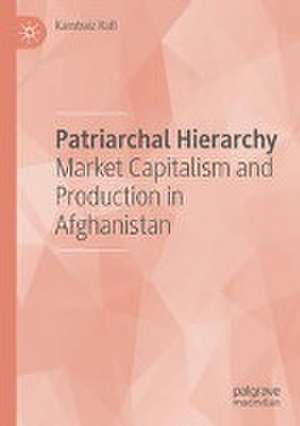Patriarchal Hierarchy: Market Capitalism and Production in Afghanistan
Autor Kambaiz Rafien Limba Engleză Paperback – 5 mai 2023
The book underscores ‘socially contingent knowledge’ and its role in private resource allocation where the private sector’s involvement is fledgling, bringing out the limitations and possibilities that this feature entails. It raises important questions and deals with problems that are relevant to contemporary debates in economics and political economy of development.
| Toate formatele și edițiile | Preț | Express |
|---|---|---|
| Paperback (1) | 696.82 lei 6-8 săpt. | |
| Springer International Publishing – 5 mai 2023 | 696.82 lei 6-8 săpt. | |
| Hardback (1) | 702.24 lei 6-8 săpt. | |
| Springer International Publishing – 4 mai 2022 | 702.24 lei 6-8 săpt. |
Preț: 696.82 lei
Preț vechi: 819.79 lei
-15% Nou
Puncte Express: 1045
Preț estimativ în valută:
133.35€ • 137.76$ • 110.98£
133.35€ • 137.76$ • 110.98£
Carte tipărită la comandă
Livrare economică 26 martie-09 aprilie
Preluare comenzi: 021 569.72.76
Specificații
ISBN-13: 9783030984090
ISBN-10: 3030984095
Pagini: 327
Ilustrații: XVII, 327 p. 17 illus.
Dimensiuni: 148 x 210 mm
Greutate: 0.42 kg
Ediția:1st ed. 2022
Editura: Springer International Publishing
Colecția Palgrave Macmillan
Locul publicării:Cham, Switzerland
ISBN-10: 3030984095
Pagini: 327
Ilustrații: XVII, 327 p. 17 illus.
Dimensiuni: 148 x 210 mm
Greutate: 0.42 kg
Ediția:1st ed. 2022
Editura: Springer International Publishing
Colecția Palgrave Macmillan
Locul publicării:Cham, Switzerland
Cuprins
1. Introduction.- 2. Literature Review: New Institutionalist Economics (NIE).- 3. Theoretical Framework; Embodied Institutions.- 4. Enabling Environment Approach (EEA) and Aid Expenditure in Post-2001 Afghanistan.- 5. Method.- 6. Data Analysis: Habitus and Practical Knowledge of Production.- 7. Data Analysis: Elements of the Field.- 8. Data Analysis: Habitus and Adaptive Strategies for Enterprise Continuation.- 9. Conclusion.
Notă biografică
Kambaiz Rafi is a researcher in political economy with a PhD from UCL (University College London). His research focuses on economic resource allocation, and the role institutions play in economic development. Born in Afghanistan, he has studied in India, and the United Kingdom and holds a United States citizenship. He writes regularly in English and Persian for peer reviewed journals and online media.
Textul de pe ultima copertă
This book examines the reconstruction of Afghanistan’s economy during the US and international occupation of the country between 2001 and 2021. Applying an institutionalist framework and based on extensive empirical data, it focuses on resource allocation by private individuals in manufacturing activities. As such, market-oriented policy adopted in this period is analysed to highlight its suitability in such a context for achieving relatively better and more productive resource allocation.
The book underscores ‘socially contingent knowledge’ and its role in private resource allocation where the private sector’s involvement is fledgling, bringing out the limitations and possibilities that this feature entails. It raises important questions and deals with problems that are relevant to contemporary debates in economics and political economy of development.
Kambaiz Rafi is a researcher in political economy with a PhD from UCL (University College London). His research focuses on economic resource allocation, and the role institutions play in economic development. Born in Afghanistan, he has studied in India, and the United Kingdom and holds a United States citizenship. He writes regularly in English and Persian for peer reviewed journals and online media.
The book underscores ‘socially contingent knowledge’ and its role in private resource allocation where the private sector’s involvement is fledgling, bringing out the limitations and possibilities that this feature entails. It raises important questions and deals with problems that are relevant to contemporary debates in economics and political economy of development.
Kambaiz Rafi is a researcher in political economy with a PhD from UCL (University College London). His research focuses on economic resource allocation, and the role institutions play in economic development. Born in Afghanistan, he has studied in India, and the United Kingdom and holds a United States citizenship. He writes regularly in English and Persian for peer reviewed journals and online media.
Caracteristici
Highlights the development challenges seen in Afghanistan and the reasons why it is still reliant on agriculture Provides a critical examination of a market-based regime Explores the power of ideology and how it is converted into policy and practice
